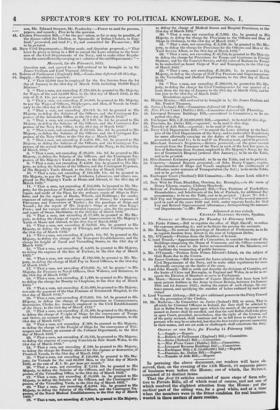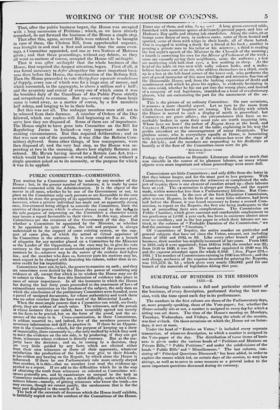In perusing the above document, our readers will have ob-
served, that, on the evening of the 14th March, 59 separate pieces of business were before the House; one of which, the SUPPLY, consisted of 34 distinct items. That the first 29 articles consisted of mere steps of form rela- tive to Private Bills, all of which went of course, and not one of which received the slightest attention from the House: yet the earliest part of the sitting was, for a good while, and at a time when the members were in the fittest condition for real business, wasted in these =Wen et mere routine.
That, after the public business began, the House was occupied with r. long succession of Petitions ; which, as we have already remarked, do not forward the business of the House a single step. That after this, again, several Bills were ordered to be brought in (one of these, the Cholera Bill, from apprehended urgency, was brought in and read a first and second time the same even- ing), a Committee appointed, and one or two Notices of Motions given ; and that these proceedings, without any debate, as they all went as matters of course, occupied the House till midnight. That it was after nudnig,ht that the whole business of the House, that required the deepest attention, began. First of all, it was found necessary to Ater altogether the most important busi- ness then before the House, the consideration of the Reform Bill. 'Then the House proceeded to vote thirty-four separate resolutions of Supply, every one of which was for a large sum of money, and which amounted, in the aggregate, to above a million and a half; and the propriety and extent of every one of which sums it was the bounden duty of the Guardians of the Public Purse strictly and scrupulously to examine. But no,—every one of these large sums is voted away, as a matter of course, by a few members half asleep, and longing to be in their beds.
But this was not all. The unhappy members were still not to be released from their durance. A number of Orders of the Day followed, which our readers will find beginning at No. 46. Ob- serve how they are disposed of. Some of them are of importance. The House ought to have gone into Committee on the Bill for Regulating Juries in Ireland—a very important matter in existing circumstances. But this required deliberation ; and as that was now out of the question, it was (like the Reform Com- mittee) deferred. Some other things, of less consequence, were then disposed of; and the very last step, as the House was se- parating at two in the morning, shows how slightly Returns are ordered. Mr. HUME having moved for a Return (see Art. 59)— which would lead to expense—it was ordered of course, without a single question asked as to its necessity, or the purpose for which it was to be applied.



















































 Previous page
Previous page